Prolonged psychosis is a relatively rare side effect of psychedelic medicine. In randomized, controlled studies, when participants are screened for a susceptibility to psychotic disorders, and have solid preparation sessions before a psychedelic session, the risk of psychosis seems limited to non-existent.
But these studies usually focus on taking a limited quantity of a psychedelic only a couple of times. Do the risks for psychosis increase when one is taking much larger doses of psychedelics weekly for years? What about when one is mixing multiple psychedelics together on a frequent basis? We do not yet know the answer to these questions as the data collected so far is limited. However, there is some evidence that people with a diagnosis or predisposition towards bipolar disorder or schizophrenia are at increased risk of psychosis.
Unusual Beliefs vs. Psychosis
When does someone cross a line from having unusual beliefs, a creative mind, or a spiritual emergency to suffering from frank psychosis? And regardless of the answer to this question, when might a therapist work towards opening a client even more to the new reality they have discovered, or choose to help ground them back to the reality that was suspended?
Having symptoms such as hallucinations, delusions, and paranoia, is often frightening and traumatic for clients. Clinicians working in the psychedelic space need to be educated on how to work with these experiences.
Is “Psychosis” an acceptable word in the psychedelic space?
There is indeed a hesitancy in the psychedelic space to equate “poor reality testing” with dysfunction and psychosis, and this makes a lot of sense. After all, when one takes a psychedelic, one is intentionally seeking to dissolve their usual reality, and make space for new perspectives. And let’s face it, aren’t we all just a wee bit ‘psychotic’ at baseline? That is, don’t we all filter the world through our own biases, see what we want to see, and discard evidence that doesn’t feel right? And don’t we all jump to conclusions as our brain tries to make sense of the chaotic patterns that surround us?
Being open to another reality of self, other, and the world, can bring such profound understanding and growth. As we let go of our hold on “reality”, some would argue we get closer to the “truth” and move beyond our tiny minds. So, this movement against labeling unusual beliefs in the psychedelic space as pathological, seems inevitable and important.
However, people who launch into other realm, do need to return to their jobs, families, problems, and day to day functioning. And, perhaps there hasn’t been enough emphasis on helping people who have had challenging post-psychedelic experiences enter back into the “real world”. I was inspired to learn about a non-profit group called Coming Home who are working on gathering research on challenging psychedelic experiences. With all the hype around psychedelic medicine, it’s important to also gather evidence about potential side effects.
Learning Lessons from CBT for Psychosis and Psychedelics
There are many tools that psychedelic therapists use to help ground people when they return, which include various kinds of therapy and integration techniques. I am wondering if the psychedelic movement could also learn a few new tools from the groundbreaking work that has been done in CBT for psychosis.
In CBT for psychosis, the goal is to collaboratively explore the client’s reality and understand the personal meaning for the client, without judgement. Even though it is termed “CBT for psychosis”, most therapists in this area do not use the word psychosis, which carries a lot of stigma. Instead, they prefer “unusual beliefs” or a “creative mind” (I’ll use this language moving forward when talking about psychosis and psychedelics).
When working with a client with unusual beliefs, one focuses on building an alliance, suspending judgement, and listening on multiple levels. Even though the client’s concrete ideas may not seem plausible, in a metaphorical sense, they are often describing a creative truth of their deepest experiences, feelings, desires, and fears.
Follow your Curiosity
Sign up to receive our free psychedelic courses, 45 page eBook, and special offers delivered to your inbox.Sometimes, I’ve found it helpful to separate the expansive, creative experience from the meaning or interpretation that may come afterward. For example, someone undergoing a psychedelic experience may have a mystical experience and feel connected to God. This can be validated, normalized, celebrated, and taken for the experience it is. However, when the client makes cognitive interpretations from this feeling – such as “this experience means I am a prophet,” it may be useful to bring in some critical thinking.
I wonder if for some people it may be helpful to provide some psychoeducation about how our creative and/or spiritual experiences are partly filtered through their own human mind. Therefore, the process of attributing meaning may take some time and layered reflection to unpack important messages.
Learning Lessons from Dream Analysis
Perhaps we can also learn techniques of working with unusual experiences of reality from dream interpretation. We know there is so much meaning in dreams, and we also see how dreams have many layers. Some people may analyze a poignant dream for years as they work to understand the many angles and dimensions of its wisdom. Sometimes a person appears in our dreams but actually symbolizes a different person or even a concept.
We may need to look deeply into ourselves to understand our dreams. For example, if I dream about a bicycle, it does not necessarily mean I should buy one tomorrow. It may mean I want to travel more, or be outside more, or need more movement in my life. Or perhaps, I dreamt about a bike after reading of Albert Hoffman’s famous LSD bike ride, and so my dream is a metaphor of me entering the psychedelic world. Perhaps in the dream, I was nervous riding the bike, and there is some fear around taking psychedelics and something dangerous happening. Obviously, exploring each layer and personal meaning are helpful in understanding the dream’s significance.
Honoring Paradox
I realize some people may disagree with me and think psychedelics gives us access to pure truth, spirits, and a metaphysical reality that should be accepted at face value. I honor this viewpoint. Perhaps there is a way for us to hold many viewpoints at the same time. Indeed, many esteemed teachers in the field of psychedelics point to how psychedelics can teach us to hold paradox.







